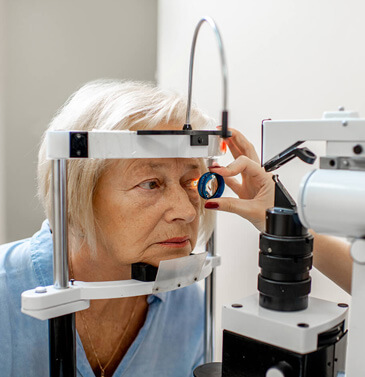In the United States, 120,000 cases of blindness result from glaucoma out of 2.3 million cases. That’s about 5% compared to site impairment which impacts 10% of these cases. It’s important to seek treatment as quickly as possible to avoid loss of vision.
Will You Go Blind?
If you’re like many people, once faced with a diagnosis of glaucoma, the first question that comes to mind is whether you will go blind.
Most patients do not go blind. In fact, blindness due to glaucoma is relatively rare. However, some vision loss may occur, so it’s essential to determine your options with a visit to your optometrist in Paducah, KY.
Despite the risk, receiving the correct treatment can stabilize your condition. Correctly using your eye drops consistently dramatically increases your chance of a favorable outcome.
Risk Factors for Glaucoma
Although anyone can get this eye disease, certain people may be at higher risk. Major risk factors include:
- Being age 60 or older
- African American or Hispanic descent and over 40 years of age
- Family history of glaucoma
Talk to your eye doctor regarding your particular risk factors and ask how often you should be checked for glaucoma. If you have a family history of glaucoma, tell your optometrist that you are concerned about developing the disease.
When to See Your Eye Doctor Immediately
If you experience certain symptoms, it’s important to see your optometrist or go to the emergency room right away.
Symptoms of angle-closure glaucoma include:
- Intense eye pain
- Red eyes
- Upset stomach
- Blurry vision
These symptoms should send you to the emergency room or doctor’s office right away.

How Does the Eye Doctor Diagnose Glaucoma?
Your optometrist checks for glaucoma by dilating your eyes during a regular exam. The exam is simple and pain-free. Your doctor places eye drops in each eye to widen your pupils, then checks for glaucoma as well as other eye conditions. As part of the test, your eye doctor also tests your peripheral vision.
There are several ways this eye disease can be treated, including medicines such as eye drops, surgery, and laser treatment.
If you are diagnosed with glaucoma, work with your eye doctor to start treatment as soon as possible. While it can’t reverse damage to your eyes, treatment can prevent this eye disease from worsening.
Here are the main treatment types:
- Medicines. These are typically eye drops that lower the pressure in your eye to protect the optic nerve from damage.
- Laser treatment. Doctors can use lasers to drain the fluid from your eye. This is a simple outpatient procedure.
- Surgery. Surgery is usually the last treatment type, reserved for cases when laser treatment and medicines do not work. Various surgeries can be used to drain the fluid from your eyes.
How Is Glaucoma Treated?
It is a serious eye disease, but treatment can preserve your vision. Keep in mind the following tips when discussing your condition with your doctor:
- If your eye doctor prescribes drops or other medicine, take it consistently and as directed
- Let your optometrist know immediately if you experience any side effects from the treatment
- Make regular checkups for your vision even after glaucoma has been treated
- If your glaucoma interferes with your daily activities, ask your optometrist about devices and low-vision services that can make life easier until you can receive treatment.
- Since this condition runs in families, encourage loved ones to get checked for glaucoma as well
Local Optometrist in Paducah, KY
At Brush Optical in Paducah, KY, we understand the challenges of living with glaucoma. Contact us today to discuss your condition or to make an appointment.






